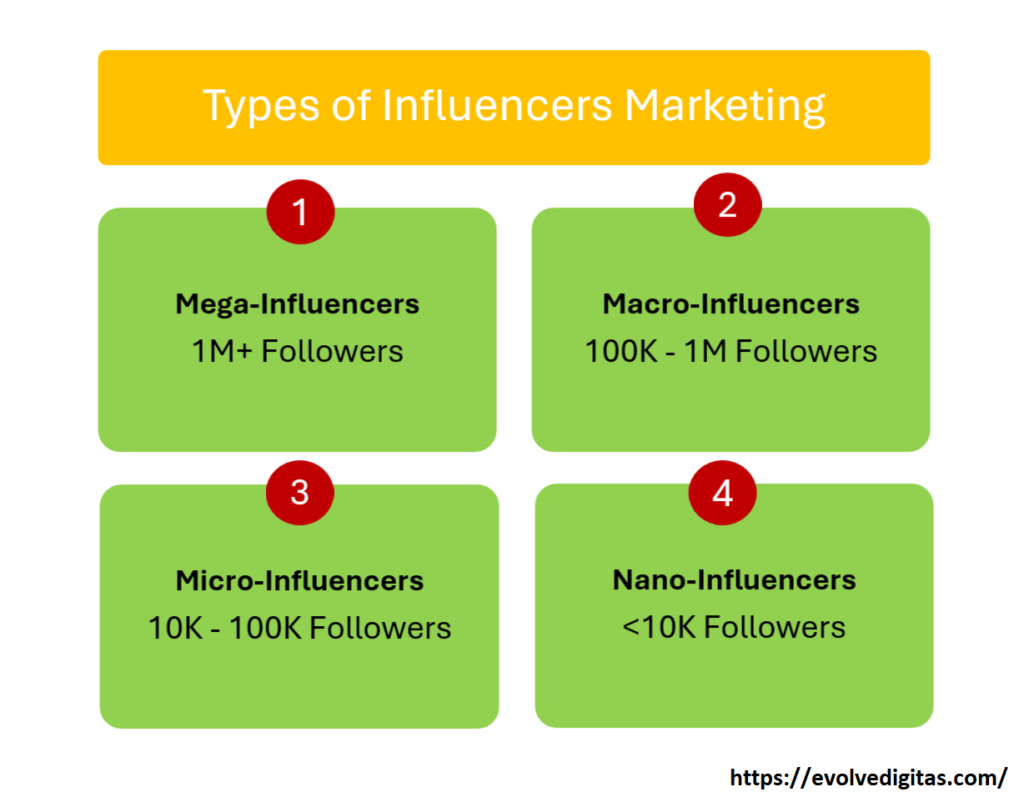Influencer Marketing
In today's digital age, Influencer Marketing has become an integral part of many businesses' marketing strategies, especially in industries such as fashion, beauty, travel, lifestyle, and wellness. By tapping into the power of influencers, businesses can amplify their brand messaging, foster meaningful connections with their target audience, and ultimately drive higher conversion rates and business growth.
What you’ll learn in this guide:
- What is Influencer Marketing
- Types of Influencer Marketing
- Types of Influencers
- Types of Influencers by Industry or Niche
- Benefits of Influencer Marketing
- How to Implement an Influencer Marketing Strategy
What is Influencer Marketing?
Influencer Marketing is a strategy where brands collaborate with individuals who have a significant following on social media platforms. These influencers promote the brands' products or services to their audience, leveraging their trust and engagement to increase brand awareness and drive sales. Influencer marketing can involve various types of content, including posts, stories, videos, and live streams, depending on the platform and the influencer's style. This form of marketing capitalizes on the influencer's ability to affect the purchasing decisions of their followers.
Types of Influencer Marketing
Influencer marketing can take various forms, each tailored to different goals and audience engagement strategies. Here are some common types:
1. Sponsored Content:
Influencers create and share content featuring a brand’s product or service in exchange for compensation.
2. Product Reviews:
Influencers provide honest reviews of a brand’s products, offering their opinions and experiences.
3. Giveaways and Contests:
Influencers host giveaways or contests to promote a brand, encouraging their followers to participate and engage.
4. Brand Ambassadors:
Long-term partnerships where influencers regularly promote a brand and embody its values.
5. Affiliate Marketing:
Influencers earn a commission by promoting a brand’s products and driving sales through unique affiliate links.
6. Unboxing and Hauls:
Influencers share their excitement and first impressions of a brand’s products by unboxing them on camera.
7. Guest Blogging/Vlogging:
Influencers create content for a brand’s blog or YouTube channel, lending their voice and perspective.
8. Social Media Takeovers:
Influencers temporarily manage a brand’s social media account to engage with their audience and provide fresh content.
Each type of influencer marketing serves different objectives, from boosting brand awareness to driving sales and increasing social media engagement.
Types of Influencers
1. Mega-Influencers:
- Typically, have over 1 million followers.
- Often celebrities or well-known public figures.
2. Macro-Influencers:
- Have between 100,000 and 1 million followers.
- Known within a specific industry or niche.
3. Micro-Influencers:
- Have between 10,000 and 100,000 followers.
- Highly engaged audiences, often in specific niches.
4. Nano-Influencers:
- Have fewer than 10,000 followers.
- Highly personalized and trusted by their small but loyal audience.

Types of Influencers by Industry or Niche
Influencers can also be categorized by the industry or niche they focus on. Here are some common types:
1. Fashion Influencers:
Share fashion tips, style advice, and outfit inspirations.
2. Beauty Influencers:
Focus on makeup tutorials, skincare routines, and beauty product reviews.
3. Travel Influencers:
Highlight travel destinations, experiences, and tips for travelers.
4. Fitness Influencers:
Provide workout routines, fitness tips, and healthy lifestyle advice.
5. Food Influencers:
Share recipes, food reviews, and culinary adventures.
6. Tech Influencers:
Review gadgets, provide tech news, and offer insights into the latest technology trends.
7. Parenting Influencers:
Share parenting tips, family activities, and child-related advice.
8. Finance Influencers:
Provide financial advice, investment tips, and insights into personal finance.
9. Gaming Influencers:
Focus on game reviews, live streaming, and gaming tips.
10. Lifestyle Influencers:
Cover a broad range of topics including daily life, personal development, and general lifestyle tips.
Each type of influencer serves a specific audience and can be highly effective in reaching niche markets.
Benefits of Influencer Marketing
Influencer marketing can significantly benefit businesses in achieving their goals through several keyways:
1. Increased Brand Awareness:
Influencers introduce your brand to their followers, expanding your reach.
2. Enhanced Credibility and Trust:
Influencers’ endorsements lend credibility to your brand, building trust with potential customers.
3. Targeted Audience Engagement:
Collaborating with influencers in your niche ensures that your message reaches a relevant and engaged audience.
4. Content Creation:
Influencers generate high-quality content that can be repurposed across your marketing channels.
5. Boosted Sales and Conversions:
Influencer recommendations can drive their followers to make purchases, increasing your sales.
6. SEO Benefits:
Influencers can improve your search engine ranking through backlinks and increased online visibility.
By leveraging influencers’ connections with their audience, businesses can achieve a range of marketing objectives more effectively.
How to Implement an Influencer Marketing Strategy
1. Define Your Goals: Before diving into influencer marketing, it’s crucial to have clear objectives. Are you looking to increase brand awareness, drive sales, or build a loyal community? Knowing your goals will help you choose the right influencers and measure success effectively.
2. Identify the Right Influencers: Research and identify influencers whose values align with your brand and whose audience matches your target demographic. Tools like Fluxed, and even social media platforms themselves can help you find suitable influencers.
3. Build Authentic Relationships: Approach influencers as partners rather than just promotional tools. Building genuine relationships can lead to more authentic endorsements and long-term collaborations that benefit both parties.
4. Develop Creative Campaigns: Work with influencers to develop creative and engaging campaigns that resonate with their audience while promoting your brand. Whether it’s a product review, a giveaway, or a behind-the-scenes look, the content should feel natural and engaging.
5. Measure and Optimize: Track the performance of your influencer marketing campaigns using metrics such as engagement rates, click-through rates, and conversion rates. Use this data to refine your strategy and improve future campaigns.
Influencer marketing is not just a trend; it’s a powerful strategy that can propel your brand to new heights. At Evolve Digitas, we specialize in crafting tailored influencer marketing campaigns that align with your brand’s goals and resonate with your target audience. Contact us today to learn how we can help you leverage the power of influencers to achieve your marketing objectives.
By integrating influencer marketing into your digital strategy, you can tap into the authentic connections influencers have with their followers, driving engagement and growth for your brand. Ready to get started? Let’s harness the power of influencer marketing together!


